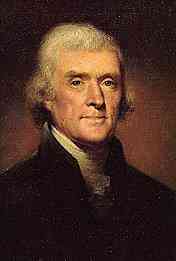To the U.S. Minister to France (Gouverneur Morris)

DEAR SIR,
-- My last to you was of Mar. 7. since which I have received your Nos. 8. and 9. I am apprehensive that your situation must have been difficult during the transition from the late form of government to the re-establishment of some other legitimate authority, and that you may have been at a loss to determine with whom business might be done. Nevertheless when principles are well understood their application is less embarrassing. We surely cannot deny to any nation that right whereon our own government is founded, that every one may govern itself under whatever forms it pleases, and change these forms at it's own will, and that it may transact it's business with foreign nations through whatever organ it thinks proper, whether King, convention, assembly, committee, President, or whatever else it may chuse. The will of the nation is the only thing essential to be regarded. On the dissolution of the late constitution in France, by removing so integral a part of it as the King, the National Assembly, to whom a part only of the public authority had been delegated, sensible of the incompetence of their powers to transact the affairs of the nation legitimately, incited their fellow citizens to appoint a national convention during this defective state of the national authority. Duty to our constituents required that we should suspend paiment of the monies yet unpaid of our debt to that country, because there was no person or persons substantially authorized by the nation of France to receive the monies and give us a good acquittal. On this ground my last letter desired you to suspend paiments till further orders, with an assurance, if necessary, that the suspension should not be continued a moment longer than should be necessary for us to see the re-establishment of some person or body of persons with authority to receive and give us a good acquittal. Since that we learn that a Convention is assembled, invested with full powers by the nation to transact it's affairs. Tho' we know that from the public papers only, instead of waiting for a formal annunciation of it, we hasten to act upon it by authorizing you, if the fact be true, to consider the suspension of paiment, directed in my last letter, as now taken off, and to proceed as if it had never been imposed; considering the Convention, or the government they shall have established as the lawful representatives of the Nation and authorized to act for them. Neither the honor nor inclination of our country would justify our withholding our paiment under a scrupulous attention to forms. On the contrary they lent us that money when we were under their circumstances, and it seems providential that we can not only repay them the same sum, but under the same circumstances. Indeed, we wish to omit no opportunity of convincing them how cordially we desire the closest union with them: Mutual good offices, mutual affection and similar principles of government seem to have destined the two people for the most intimate communion, and even for a complete exchange of citizenship among the individuals composing them.
During the fluctuating state of the Assignats of France, I must ask the favor of you to inform me in every letter of the rate of exchange between them & coin, this being necessary for the regulation of our custom houses. We are continuing our supplies to the island of St. Domingo at the request of the Minister of France here. We would wish however to receive a more formal sanction from the government of France than has yet been given. Indeed, we know of none but a vote of the late National Assembly for 4 millions of livres of our debt, sent to the government of St. Domingo, communicated by them to the Minister here, & by him to us. And this was in terms not properly applicable to the form of our advances. We wish therefore for a full sanction of the past & a complete expression of the desires of their government as to future supplies to their colonies. Besides what we have furnished publicly, individual merchants of the U.S. have carried considerable supplies to the island of St. Domingo, which have been sometimes purchased, sometimes taken by force, and bills given by the administration of the colony on the minister here, which have been protested for want of funds. We have no doubt that justice will be done to these

